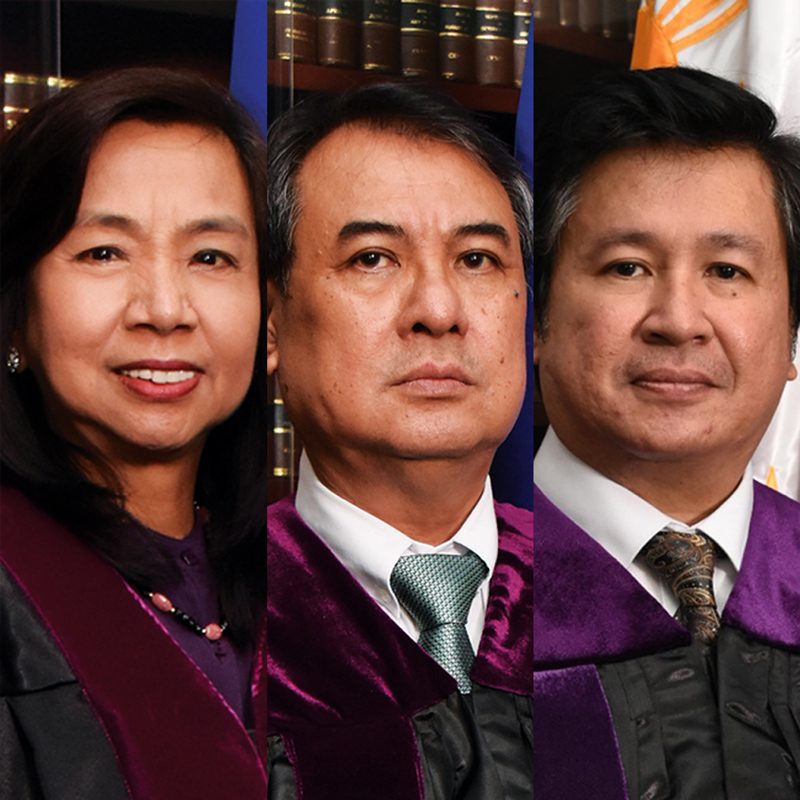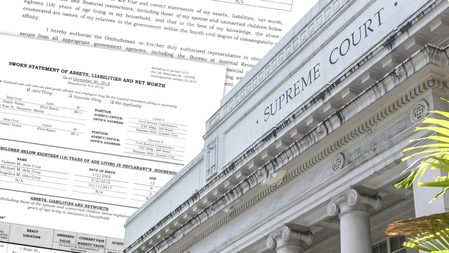SUMMARY
This is AI generated summarization, which may have errors. For context, always refer to the full article.

During the Judicial and Bar Council (JBC) interviews on Friday, March 12, chief justice applicants were able to express their views on Statements of Assets, Liabilities and Net Worth (SALNs), but their positions still remained in that grey area between upholding transparency and protecting justices from the “weaponization” of SALNs.
Their answers fell short – as limited also by the questions – of stating concrete policy actions on the release of their own SALNs.
Senior Associate Justice Estela Perlas-Bernabe said that SALNs had become “weaponized to some extent.” It was a response to the question of JBC member retired justice Noel Tijam if she agreed with Ombudsman Samuel Martires that SALNs had become weaponized.
“I have nothing to hide, it’s just that sometimes people tend to criticize, find ways and means to destroy the reputation of justices,” said Bernabe.
Bernabe said the public can have access to summaries of the justices’ SALNs, which is pursuant to a post-Corona administrative ruling that says all requests for full copies of their SALNs must be approved by the en banc.
In 2019, the Supreme Court en banc denied the request of Rappler and other stakeholders for the full copies of the justices’ 2018 SALNs.
“Summary of SALN would be enough…it might come to a point where the SALN can be used to destroy his reputation, and the justice will be so busy defending himself or herself,” said Bernabe.
Summaries of SALNs only show amounts of their real properties, personal properties, total assets, liabilities, and net worth. Yet the Supreme Court has not released even summaries of justices’ SALNs after 2017.
Associate Justice Alexander Gesmundo said full copies of the SALN may be given if the reason is justified, again pursuant to the post-Corona ruling.
“Transparency is the rule, and I don’t think there should be any objection on that aspect. They can possibly get the entire copy of the SALN, but you have to consider the purpose, it must be legitimate,” said Gesmundo.
The questions did not allow for them to expound whether there has to be policy changes to balance transparency and the need to protect judges and justices from harassment via their SALNs.
The Sereno issue
Associate Justice Ramon Paul Hernando was asked the question too, but his answer was also limited by the questioner, who was Tijam.
Tijam had asked if former chief justice Maria Lourdes Sereno can have her benefits, even though she was ousted.
Hernando had penned the ruling granting full retirement benefits to the widow of the late former chief justice Renato Corona, who was ousted by the Senate sitting as an impeachment court in 2012. Corona was ousted because of non-disclosures of peso and dollar deposits in his SALNs.
In that ruling, Hernando said SALNs must not be used as a tool for political vendetta.
Tijam asked Hernando if his Corona ruling should apply to Sereno. Tijam wrote the Sereno ouster ruling.
“She was removed via quo warranto, so that’s judicial. That was judicial, and by virtue of your ponencia, she was divested of entitlement of retirement benefits,” said Hernando. Tijam did not follow up.
Supreme Court faces this SALN challenge because while there is an institutional view that SALNs should not be weaponized, a majority of the justices ousted Sereno saying that her non-filing of SALNs was a lack of integrity that made her not qualified for the post of chief justice.
Integrity is a unique requirement of the Constitution for one to become a Supreme Court justice. There is no such requirement for presidents and vice presidents. – Rappler.com
Add a comment
How does this make you feel?





There are no comments yet. Add your comment to start the conversation.